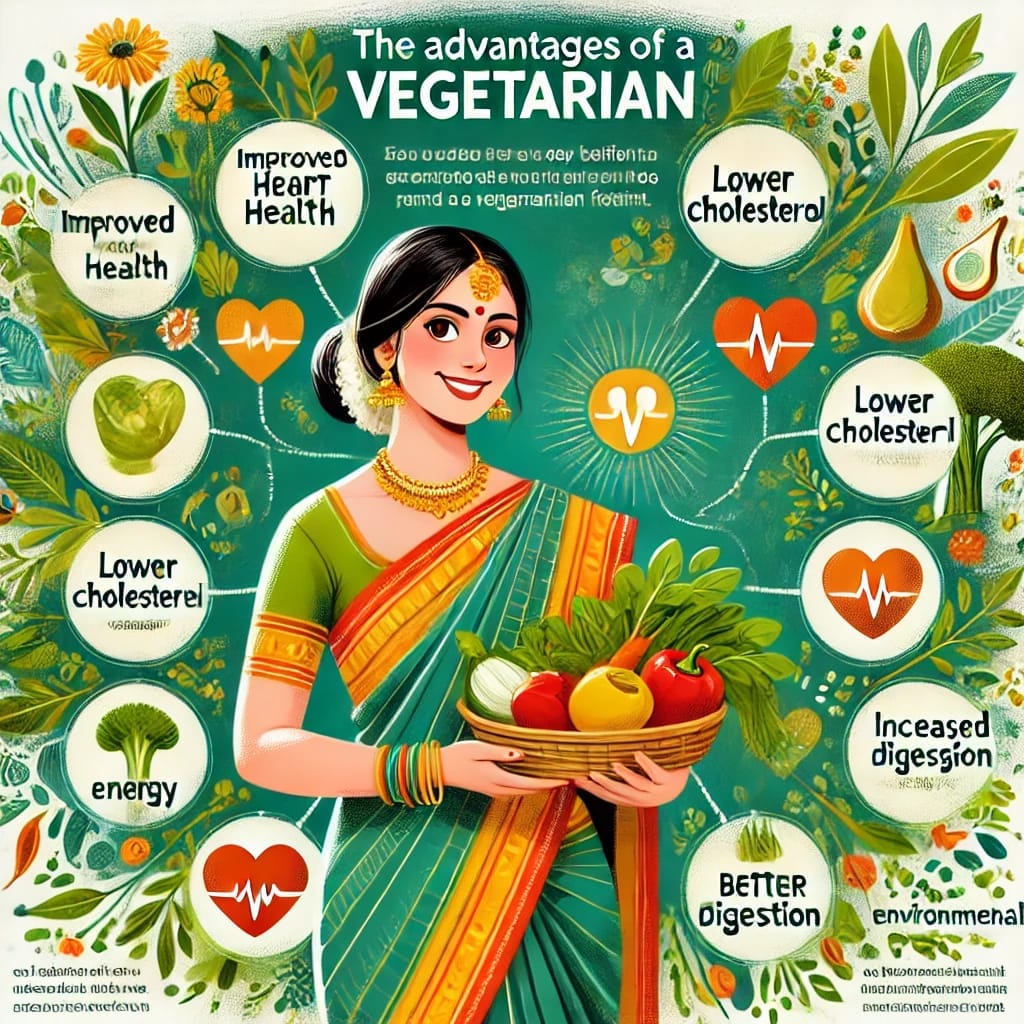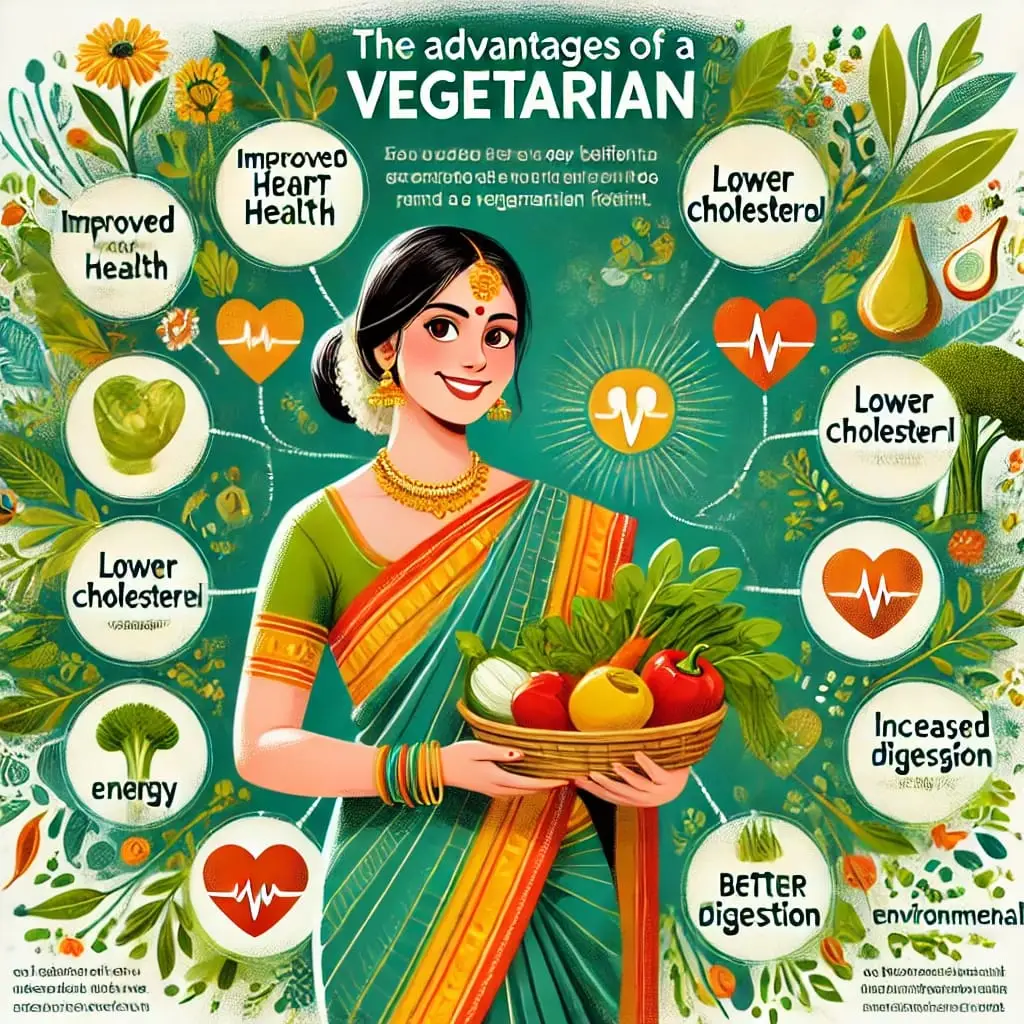
Advantages of a Vegetarian Diet
Introduction
A vegetarian diet is one that excludes meat, poultry, and fish, focusing instead on plant-based foods such as fruits, vegetables, grains, nuts, and legumes. With more people adopting vegetarian lifestyles due to health, environmental, and ethical reasons, it’s important to understand the advantages of this diet. This article explores the numerous benefits of a vegetarian diet, ranging from improved health to sustainability and ethical eating.
Health Benefits of a Vegetarian Diet
Improved Heart Health
One of the biggest advantages of a vegetarian diet is its positive impact on heart health. Studies show that vegetarians tend to have lower cholesterol levels and a reduced risk of heart disease. Since plant-based foods are naturally low in saturated fat and cholesterol, they help maintain a healthy cardiovascular system.
Weight Management
A vegetarian diet is often linked to a healthier body weight. Many plant-based foods are lower in calories and higher in fiber, which keeps you feeling full for longer, reducing overeating. Research has found that vegetarians have a lower risk of obesity compared to meat-eaters.
Better Digestive Health
A vegetarian diet is typically high in dietary fiber, which promotes good digestion and prevents constipation. Fiber-rich foods, such as whole grains, legumes, and vegetables, support gut health by encouraging the growth of beneficial bacteria.
Lower Risk of Chronic Diseases
Vegetarians have a lower risk of developing chronic conditions like type 2 diabetes, high blood pressure, and certain cancers. Plant-based diets are rich in antioxidants and anti-inflammatory compounds that protect against cell damage and disease.

Environmental Benefits of a Vegetarian Diet
Reduced Carbon Footprint
Animal agriculture is a major contributor to greenhouse gas emissions. By reducing meat consumption, a vegetarian diet significantly lowers carbon emissions, helping to combat climate change.
Conservation of Water Resources
Meat production requires a tremendous amount of water, from feeding livestock to processing meat. A plant-based diet uses significantly less water, making it a more sustainable choice.
Preservation of Biodiversity
The demand for meat contributes to deforestation and habitat destruction. Choosing a vegetarian diet helps protect wildlife and maintain biodiversity by reducing the strain on natural ecosystems.
Ethical and Moral Reasons
Animal Welfare
Many people choose a vegetarian diet to prevent animal suffering. Factory farming practices often involve cruelty, and avoiding meat consumption supports humane treatment of animals.
Ethical Eating Choices
A vegetarian diet aligns with ethical concerns about the treatment of animals and responsible food consumption. It promotes more sustainable and humane food systems.
Nutritional Considerations in a Vegetarian Diet
Essential Nutrients
It’s possible to get all the necessary nutrients from a vegetarian diet. Protein sources include beans, lentils, tofu, and nuts. Other important nutrients like calcium and vitamin D can be found in dairy or plant-based alternatives.
Overcoming Nutrient Deficiencies
Vegetarians should be mindful of nutrients such as vitamin B12, iron, and omega-3 fatty acids. Fortified foods and dietary supplements can help maintain proper nutrition.
Economic Benefits of a Vegetarian Diet
Cost-Effectiveness
Plant-based foods like grains, beans, and vegetables are generally more affordable than meat. A vegetarian diet can save money while still providing a nutritious and balanced meal plan.
Sustainable Food Choices
Supporting local farmers and purchasing seasonal produce can make a vegetarian diet both cost-effective and environmentally sustainable.
Conclusion
A vegetarian diet offers numerous benefits, including better health, environmental sustainability, and ethical eating. Whether you are considering switching to vegetarianism for personal, ethical, or health reasons, it’s a lifestyle that promotes overall well-being. Give it a try and experience the advantages firsthand!
FAQs
- Is a vegetarian diet suitable for all age groups? Yes, with proper planning, a vegetarian diet can provide adequate nutrition for all age groups.
- Can I get enough protein on a vegetarian diet? Absolutely! Plant-based protein sources like beans, lentils, and tofu offer sufficient protein.
- How does a vegetarian diet impact athletic performance? Many athletes thrive on vegetarian diets, as plant-based foods provide essential nutrients and energy.
- What are the best sources of iron in a vegetarian diet? Leafy greens, lentils, and fortified cereals are excellent sources of iron.
- Is a vegetarian diet expensive compared to a non-vegetarian diet? No, it is often more affordable, as plant-based foods tend to cost less than meat.
Want More Energy Naturally?
Discover 10 proven ways to boost your energy levels and feel revitalized every day!
Read NowLet’s Connect!
Have questions, collaborations, or just want to say hello? Feel free to reach out!
Contact MeKnow More About Me!
Discover my journey, passion, and what drives me to create valuable content for you.
Read My Story






